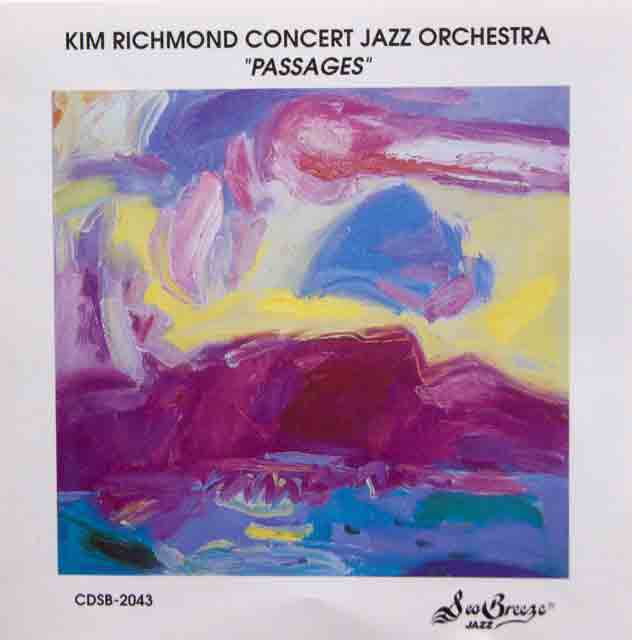| Passages | Recordings |

|
|
Personnel:
Woodwinds: Sal Lozano, Phil Feather, Glen Berger, John Yoakim or John Mitchell, Bob Carr |
||
|
|
Selections:
Liner Notes:
- Passages
The rhythm section team of Elvin Jones, McCoy Tyner and Jimmy Garrison (of the John Coltrane Quartet) inpired the thythmic basis for this original. Bill Cunliffe on piano is heard with some fierce comping and interlude spurts which surround the spritely theme. Great solos are contributed by Glen Berger (tenor saxophone) and Clay Jenkins (trumpet) - Old Acquaintances
With an off-hand tip of thehat to Duke Ellington, the leader's solo alto initates a free and spatial setting from which emerges a gospel-feeling set of ensemble lines. Dave Scott solos on trumpet with a hip and free-spirited sound. After a long build to the climax, the leader's preaching alto leads back to a convoluted freeness, which trumpeter Clay Jenkins takes out. If you think you hear "Auld Lang Syne" in this, you're right. I always wanted to write a work on these changes, hence the title. Dig Bill Cunliffe's nearly atonal quote on the ending. - Love Walked In
This stretched-out-melodically rendition of the Gershwin standard os probably my most requested arrngement. I originally wrote it because I like the changes to blow and to write on, but prefer this melodic augmentation. Thus, this approach was spawned. Ron King (trumpet) and John Yoakum (tenor) solo effectively and the trumpets and saxes have a chance to show off as sections before the climactic recapitulation. The French horns, uoba and percussion add a lot to this chart. - Passacaglia/My Funny Valentine
Composer/guitarist Larry Koonse's charming original"Jazz Passacaglia" starts teh performance providing an orchestral approach which settles into my solo alto feature on this great standard, on of my favotie ballad melodies. - Melon Bells
Written for a jazz festival which featured drummers Mel Lewis and Louis Bellson, this performance displays the enormous talents of Ralph Razze. Whether it is swinging hard and straight ahead, playing free or trading solo 4's and 8's with the ensemble. Ralph's ability is outstanding. He should be more widely known. The other soloists are Phil Feather, (on flute, riding above the ensemble throughout and with a short solo spurt before the development section), Dave Scott (trumpet) and the outrageous trombone of George McMullen. - Street of Dreams
Another of my favorite ballads, this great standard melody I consider the center piece of the album. Solo alto melody over orchestral textures lead to a duet from which ermerges teh unique individual tenor saxophone style of special guest John Gross. John improvises freely over shifting impressionistic backgrounds and leads to the main rendering of the piece. Glen Berger plays beautiful tenor solo and Sal Lozano's alto sax energy is featured before an inventive orchestral interlude leads to a trumphant climax. Lead altoist Lozano is heard concluding the melody before the leader's alto soars above a building and swinging finish. - Soft Feelings
An inventive and original mucisicna of much depth, pianist Bill Cunliffe is spotlighted here with a brilliant solo. Se did two takes; the second was completely different from the first but equally as inventive. As is often the best decision, we used the first take. Texturally symphonic orchestral color, expression and invention characterize the writing. - Chic-a-brac
This selection started as an effort to use almost exclusively two kins of chords. A 3-horn plus rhythm group introduces the melody before the full ensemble. Excellent solos by Ron King (trumpet), Rick Culver (trombone) and Ralph Razze (drums). - Image & Likeness
The outer sections of a 3-part suite, this through-composed composition features various configurations of ensemble. The analytical-minded listener will notice that, starting at the mid-point, the second section is essentially a regrograde of the first. Mostly pure section sounds here. Again, the use of the French horns, vibes and tuba add a lot. - Indian Summer
Besides being my favorite lead trombonist, Rick Culver is also an excellent jazz soloist. His velvety sound and sense of melody are superb. Here he states the opening and closing melody and does a bit of stretching out in the middle solo section. Guitarist Tom Hynes, another valuable musicians in the orchestra, stepping out from the ensemble role in which he is usually cast as a blending voice, solos nicely on this standard. - Nardis
This arrangement acts as an effective structure for some great overlaping solos by Clay Jenkins on trumpet(possibly my favorite improvisor), guest soloist John Gross (tenor sax), Bill Roper (tuba) and, throughlout, the percussion and rhythm sections. All of the development section was feely spontaneou, not pre-planned, and, in my view, an instance of inspired improving. By its very nature, another performance would be completely different. We did only on take. The orchestral ending goes out with a roar
CreditsReleased on Sea Breeze Records in February 1993 was the first CD, titled "Passages", of the Kim Richmond Concert Jazz Orchestra, a 23-piece showcase for Kim's writing and soloing abilities. The Orchestra is characterized by symphonic colors and textures over a free swinging (and sometimes free-form) jazz base.
Produced by Kim Richmond and Dan Beher
Executive producer for Sea Breeze Records: Dan Beher
Associate producer: William Motzing
Recorded at Stagg Street Studios, Van Nuys, CA, Mayy 11 & 12, 1992
Engineer: Gary Denton; ass't engineer: Robert J. Corronzo
Stagg Street Studio management: Melody Carpenter
Masterd at K-Disc, Hollywood, CA
Album cover art: Crhis Zambon
Cover art photograph: Rheuben Allen
Graphic: Scott Fuller, ZapSet, Los Angeles, CA
